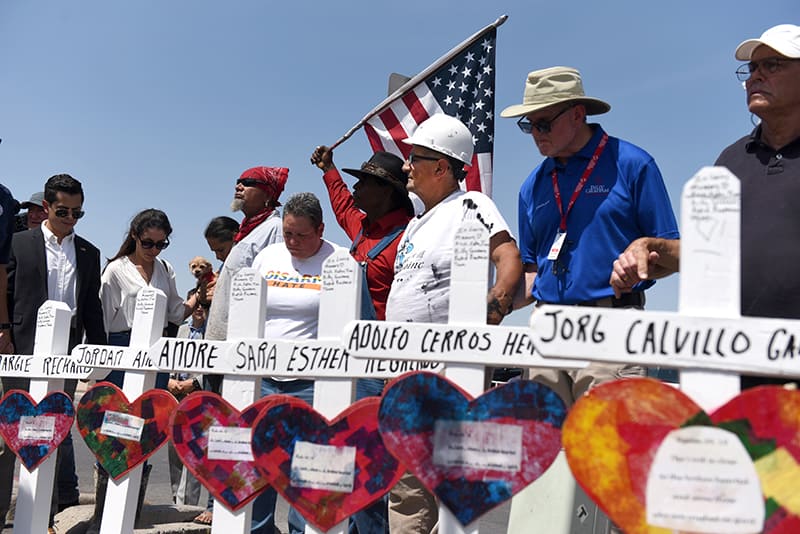
WASHINGTON (CNS) — When Bishop Mark J. Seitz of El Paso, Texas, prayed for the dead on the first anniversary in early August of the mass shooting at a Walmart in his city, he made that solemn tribute in the midst of the coronavirus pandemic, which has kept much of the U.S. public in social-distancing mode.
The level of gun violence, however, has not been reduced in the five months that Americans have sheltered in place and reduced public activity.
Those numbers have actually risen, according to statistics released by the Gun Violence Archive, a nonprofit research group that catalogs every incident of gun violence in the United States, with 56 mass shootings reported in May.
“We cannot simply accept it as the new normal,” Bishop Seitz told Catholic News Service.
Firearm deaths rose by 16% in April and 15% in May, compared to the same months in 2019, with urban areas — experiencing increased unemployment and the stress of spikes in COVID-19 cases and deaths — bearing the brunt of the violence, data from the Gun Violence Archive shows.
“For several decades, the bishops in the United States have been talking about gun violence and proposing different ways to encounter it, including reasonable measures of gun control to prevent guns from falling into the hands of folks who are going to do harm to others or to do harm to themselves,” said Michael B. O’Rouke, policy adviser for the U.S. Conference of Catholic Bishops.
Lobbying for reasonable gun laws on the state and federal level has continued among the U.S. bishops, who see this as a pro-life issue.
Gun control is a political hot button for most Americans, pro and con, and it’s no different among Catholics. They are divided on the issue, with some wanting more restrictions on the purchase of weapons and others resisting any restrictions.
Bishop Denis J. Madden, retired auxiliary bishop of the Archdiocese of Baltimore, has testified about the impact of gun violence before committees of the Maryland General Assembly over the years and said he is always surprised by the contempt he encounters by people who believe he is trying to infringe on their right to bear arms.
“I don’t believe that requiring gun registration and background checks is infringing on someone’s liberties,” Bishop Madden told CNS. “Some of the language hurled in these debates is disturbing to me, because it seems to discount the value of the lives lost to gun violence.”
Homicides only accounted for about 35% of the nearly 40,000 U.S. firearm deaths in 2017, whereas self-inflicted firearm deaths accounted for about 60%, according to the Centers for Disease Control and Prevention/National Center for Health Statistics.
During the 2019 fall general assembly of the U.S. Conference of Catholic Bishops, Bishop Frank J. Dewane of Venice, Fla., called the violent death from firearms — whether it was self-inflicted, accidental or homicide — a spiritual crisis afflicting the U.S.
Bishop Dewane, then chairman of the U.S. bishops’ Committee on Domestic Justice and Human Development, outlined the USCCB’s long-held stance of the need for “commonsense” legislation that governs the availability of guns.
Over the years, he said, the bishops have supported “commonsense” actions such as an assault weapon ban, limits on large capacity magazines, a federal law to criminalize gun trafficking, mandatory gun lock and safe storage requirements, improved access to mental health services and assessment of the impact of the portrayal of violence in various media on society.
The U.S. bishops have encountered backlash for their gun control advocacy from Catholics who believe church leaders should concentrate on the pastoral needs of their flock and stay away from such highly charged political debates.
“The bishops are used to backlash, given the divisiveness of American politics,” said Joseph E. Capizzi, professor of moral theology at The Catholic University of America in Washington. “Gun laws are politically charged, but so are most of the issues they deal with, from abortion to immigration.”
When it comes to moral issues, the seemingly political also is pastoral, Capizzi said.
“The bishops speak as our pastors, as guides to our shared good,” he said, “and when they speak about gun laws, they do so best when they connect gun violence to the widespread spiritual crisis plaguing our nation.”









